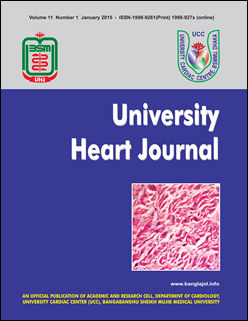The Prevalence of distorted terminal portion of QRS complex in patients of CKD with STEMI and its effect on their Outcome
DOI:
https://doi.org/10.3329/uhj.v11i1.27593Keywords:
STEMI, CKD, Distorted QRSAbstract
Background: Distorted terminal portion of QRS complex on initial electrocardiogram ( ECG) in patients with ST segment elevation myocardial infarction ( STEMI) is a strong predictor of adverse outcome. Objectives: Our purpose of this study was to assess the relationship of distortion of QRS on initial ECG in STEMI with chronic kidney diseases (CKD). Methods: We evaluated 60 patients of STEMI admitted within 12 hours and receiving thrombolytic therapy. Patients having serum creatinine < 1.5 mg/dl were group-I and ?1.5 mg/dl were group-II. We defined two ECG groups according to absence of distortion of terminal QRS and presence of distorted terminal QRS in two or more adjacent leads. Distorted QRS group further divided into pattern-A J point originating at ?50% of height of R wave in leads with qR configuration and pattern B- S wave is absent in leads with RS configuration. Additionally study population was divided into two groups on the basis of serum creatinine level. Results: CKD patients had more QRS distortion (43.2% vs 68.8%, p=0.008) and worse inhospital outcome. Out of 60 patients 7(11.6%) death, 16(26.7%) heart failure and 37(61.7%) uneventful recovery. Hospital mortality and heart failure were significantly higher in STEMI with CKD group (4.5% vs 31%, p=0.004; 16% vs 56%, p=0.001; respectively), uneventful recovery was significantly higher in STEMI without CKD group(12.5% vs 80%, p=<0.001). In multiple logistic regression analysis, CKD ( serum creatinine ?1.5) and Killip class ?II were independent predictors of QRS distortion (OR= 5.702, p=0.014; OR= 3.578,p=0.036; respectively). Conclusion: Among the CKD patients with STEMI the distorted terminal portion of QRS complex on initial ECG is more frequent and significantly related to adverse prognosis. Careful analysis of ECG which is simple, chief, universally available, bed side investigation may offer important information regarding prompt risk stratification and management in patients of CKD with STEMI.
University Heart Journal Vol. 11, No. 1, January 2015; 7-12
Downloads
214
248




